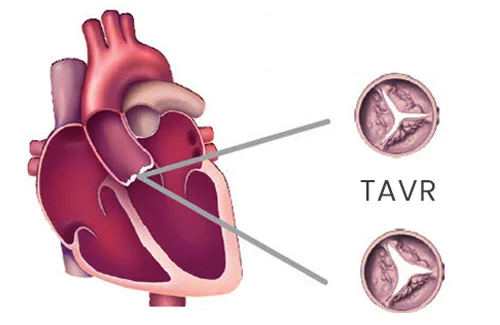TAVR
TAVR


TAVR



TAVR (Transcatheter Aortic Valve Replacement) is a revolutionary, minimally invasive cardiac procedure used to treat severe aortic stenosis, a condition in which the heart’s aortic valve becomes narrowed and restricts blood flow from the heart to the rest of the body. Traditionally treated with open-heart surgery, TAVR offers a less invasive alternative with faster recovery, especially beneficial for elderly patients or those at high surgical risk.
Dr. Mamtesh Gupta, a leading DM – Cardiology specialist in Meerut, brings her extensive expertise and dedication to patient-centered care in performing advanced procedures like TAVR. Her commitment to adopting cutting-edge techniques makes her a trusted name in interventional cardiology.
What Is Aortic Stenosis?
Aortic stenosis occurs when the aortic valve becomes thickened or calcified, restricting proper blood flow. Over time, the heart works harder to pump blood through the narrowed valve, leading to symptoms such as:
Chest pain or tightness
Shortness of breath
Fatigue, especially during exertion
Dizziness or fainting
Heart palpitations
If left untreated, severe aortic stenosis can lead to heart failure and increased risk of death. TAVR provides a vital treatment option for those who are not ideal candidates for traditional valve replacement surgery.
Unlike open-heart surgery, which requires a large chest incision and heart-lung machine support, TAVR is performed using a catheter-based approach:
A catheter is inserted through a small incision in the groin or chest.
The catheter is guided to the heart and into the aortic valve.
A collapsible replacement valve is placed over the existing damaged valve.
Once in place, the new valve is expanded, pushing the old valve leaflets aside and taking over the regulation of blood flow.
The entire procedure usually takes about 1–2 hours and is performed under local or general anesthesia, depending on the patient's condition.
TAVR is ideal for:
Elderly patients with severe symptomatic aortic stenosis
Individuals considered high-risk or inoperable for traditional open-heart surgery
Patients with other comorbidities (kidney disease, lung disease, etc.)
Individuals seeking a shorter recovery time and fewer complications
Dr. Mamtesh Gupta conducts a thorough evaluation, including imaging studies and a heart team discussion, to determine if TAVR is the best option for you.
Minimally invasive – No need for open-heart surgery
Shorter hospital stay – Many patients go home within 48–72 hours
Quick recovery – Return to normal activities sooner
Reduced risk – Lower complication rates, especially in high-risk patients
Improved quality of life – Relief from aortic stenosis symptoms
Dr. Mamtesh Gupta combines her technical expertise with compassionate care to guide patients through every step of the TAVR journey—from diagnosis to post-procedure recovery.
Following the TAVR procedure, Dr. Gupta and her team provide:
Continuous cardiac monitoring
Medication management
Lifestyle and diet counseling
Regular follow-ups to ensure the new valve is functioning optimally
Patients typically experience a dramatic improvement in symptoms and overall heart function within weeks.
With a DM in Cardiology and years of experience in interventional procedures, Dr. Mamtesh Gupta is at the forefront of heart valve innovations in Meerut. Her proficiency in performing TAVR and similar advanced procedures places her among the leading cardiologists in the region. She ensures that every patient receives individualized care using the latest techniques and technology.
Book your consultation today and take the next step toward protecting your heart and your life.